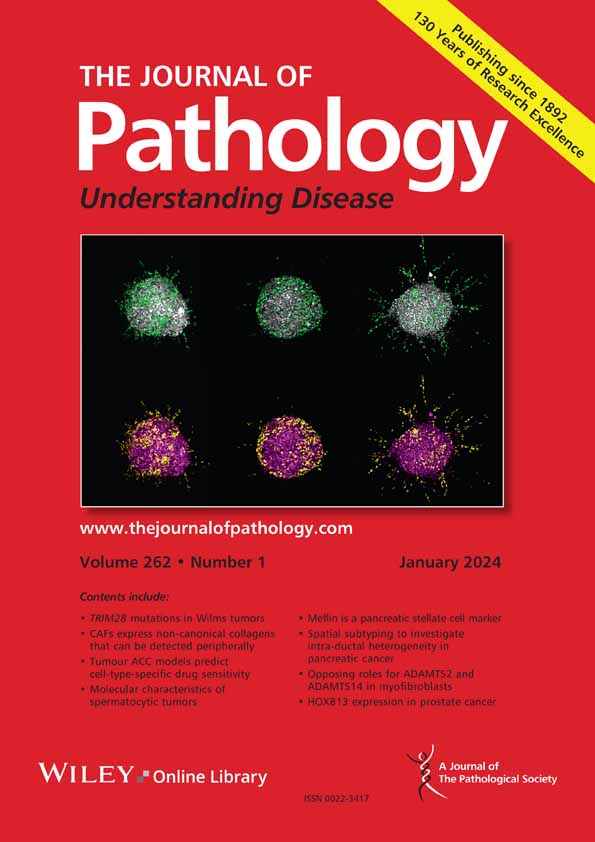Marika Milan, Fabio Maiullari, Maila Chirivì, Maria Grazia Ceraolo, Rebecca Zigiotto, Andrea Soluri, Silvia Maiullari, Elisa Landoni, Dario Di Silvestre, Francesca Brambilla, Pierluigi Mauri, Veronica De Paolis, Nicole Fratini, Maria Cristina Crosti, Chiara Cordiglieri, Chiara Parisi, Antonella Calogero, Dror Seliktar, Yvan Torrente, Chiara Lanzuolo, Gianpietro Dotti, Mirco Toccafondi, Mauro Bombaci, Elena De Falco, Claudia Bearzi, Roberto Rizzi
下载PDF
{"title":"产生硫酸软骨素蛋白多糖-4的巨噬细胞会诱发杜氏肌营养不良症的神经-心脏连接损伤。","authors":"Marika Milan, Fabio Maiullari, Maila Chirivì, Maria Grazia Ceraolo, Rebecca Zigiotto, Andrea Soluri, Silvia Maiullari, Elisa Landoni, Dario Di Silvestre, Francesca Brambilla, Pierluigi Mauri, Veronica De Paolis, Nicole Fratini, Maria Cristina Crosti, Chiara Cordiglieri, Chiara Parisi, Antonella Calogero, Dror Seliktar, Yvan Torrente, Chiara Lanzuolo, Gianpietro Dotti, Mirco Toccafondi, Mauro Bombaci, Elena De Falco, Claudia Bearzi, Roberto Rizzi","doi":"10.1002/path.6362","DOIUrl":null,"url":null,"abstract":"<p>Duchenne muscular dystrophy (DMD) is caused by the absence of the full form of the dystrophin protein, which is essential for maintaining the structural integrity of muscle cells, including those in the heart and respiratory system. Despite progress in understanding the molecular mechanisms associated with DMD, myocardial insufficiency persists as the primary cause of mortality, and existing therapeutic strategies remain limited. This study investigates the hypothesis that a dysregulation of the biological communication between infiltrating macrophages (MPs) and neurocardiac junctions exists in dystrophic cardiac tissue. In a mouse model of DMD (<i>mdx</i>), this phenomenon is influenced by the over-release of chondroitin sulfate proteoglycan-4 (CSPG4), a key inhibitor of nerve sprouting and a modulator of the neural function, by MPs infiltrating the cardiac tissue and associated with dilated cardiomyopathy, a hallmark of DMD. Givinostat, the histone deacetylase inhibitor under current development as a clinical treatment for DMD, is effective at both restoring a physiological microenvironment at the neuro-cardiac junction and cardiac function in <i>mdx</i> mice in addition to a reduction in cardiac fibrosis, MP-mediated inflammation, and tissue CSPG4 content. This study provides novel insight into the pathophysiology of DMD in the heart, identifying potential new biological targets. © 2024 The Author(s). <i>The Journal of Pathology</i> published by John Wiley & Sons Ltd on behalf of The Pathological Society of Great Britain and Ireland.</p>","PeriodicalId":232,"journal":{"name":"The Journal of Pathology","volume":"265 1","pages":"1-13"},"PeriodicalIF":5.6000,"publicationDate":"2024-11-11","publicationTypes":"Journal Article","fieldsOfStudy":null,"isOpenAccess":false,"openAccessPdf":"https://www.ncbi.nlm.nih.gov/pmc/articles/PMC11638662/pdf/","citationCount":"0","resultStr":"{\"title\":\"Macrophages producing chondroitin sulfate proteoglycan-4 induce neuro-cardiac junction impairment in Duchenne muscular dystrophy\",\"authors\":\"Marika Milan, Fabio Maiullari, Maila Chirivì, Maria Grazia Ceraolo, Rebecca Zigiotto, Andrea Soluri, Silvia Maiullari, Elisa Landoni, Dario Di Silvestre, Francesca Brambilla, Pierluigi Mauri, Veronica De Paolis, Nicole Fratini, Maria Cristina Crosti, Chiara Cordiglieri, Chiara Parisi, Antonella Calogero, Dror Seliktar, Yvan Torrente, Chiara Lanzuolo, Gianpietro Dotti, Mirco Toccafondi, Mauro Bombaci, Elena De Falco, Claudia Bearzi, Roberto Rizzi\",\"doi\":\"10.1002/path.6362\",\"DOIUrl\":null,\"url\":null,\"abstract\":\"<p>Duchenne muscular dystrophy (DMD) is caused by the absence of the full form of the dystrophin protein, which is essential for maintaining the structural integrity of muscle cells, including those in the heart and respiratory system. Despite progress in understanding the molecular mechanisms associated with DMD, myocardial insufficiency persists as the primary cause of mortality, and existing therapeutic strategies remain limited. This study investigates the hypothesis that a dysregulation of the biological communication between infiltrating macrophages (MPs) and neurocardiac junctions exists in dystrophic cardiac tissue. In a mouse model of DMD (<i>mdx</i>), this phenomenon is influenced by the over-release of chondroitin sulfate proteoglycan-4 (CSPG4), a key inhibitor of nerve sprouting and a modulator of the neural function, by MPs infiltrating the cardiac tissue and associated with dilated cardiomyopathy, a hallmark of DMD. Givinostat, the histone deacetylase inhibitor under current development as a clinical treatment for DMD, is effective at both restoring a physiological microenvironment at the neuro-cardiac junction and cardiac function in <i>mdx</i> mice in addition to a reduction in cardiac fibrosis, MP-mediated inflammation, and tissue CSPG4 content. This study provides novel insight into the pathophysiology of DMD in the heart, identifying potential new biological targets. © 2024 The Author(s). <i>The Journal of Pathology</i> published by John Wiley & Sons Ltd on behalf of The Pathological Society of Great Britain and Ireland.</p>\",\"PeriodicalId\":232,\"journal\":{\"name\":\"The Journal of Pathology\",\"volume\":\"265 1\",\"pages\":\"1-13\"},\"PeriodicalIF\":5.6000,\"publicationDate\":\"2024-11-11\",\"publicationTypes\":\"Journal Article\",\"fieldsOfStudy\":null,\"isOpenAccess\":false,\"openAccessPdf\":\"https://www.ncbi.nlm.nih.gov/pmc/articles/PMC11638662/pdf/\",\"citationCount\":\"0\",\"resultStr\":null,\"platform\":\"Semanticscholar\",\"paperid\":null,\"PeriodicalName\":\"The Journal of Pathology\",\"FirstCategoryId\":\"3\",\"ListUrlMain\":\"https://onlinelibrary.wiley.com/doi/10.1002/path.6362\",\"RegionNum\":2,\"RegionCategory\":\"医学\",\"ArticlePicture\":[],\"TitleCN\":null,\"AbstractTextCN\":null,\"PMCID\":null,\"EPubDate\":\"\",\"PubModel\":\"\",\"JCR\":\"Q1\",\"JCRName\":\"ONCOLOGY\",\"Score\":null,\"Total\":0}","platform":"Semanticscholar","paperid":null,"PeriodicalName":"The Journal of Pathology","FirstCategoryId":"3","ListUrlMain":"https://onlinelibrary.wiley.com/doi/10.1002/path.6362","RegionNum":2,"RegionCategory":"医学","ArticlePicture":[],"TitleCN":null,"AbstractTextCN":null,"PMCID":null,"EPubDate":"","PubModel":"","JCR":"Q1","JCRName":"ONCOLOGY","Score":null,"Total":0}
引用次数: 0
引用
批量引用



 求助内容:
求助内容: 应助结果提醒方式:
应助结果提醒方式:


